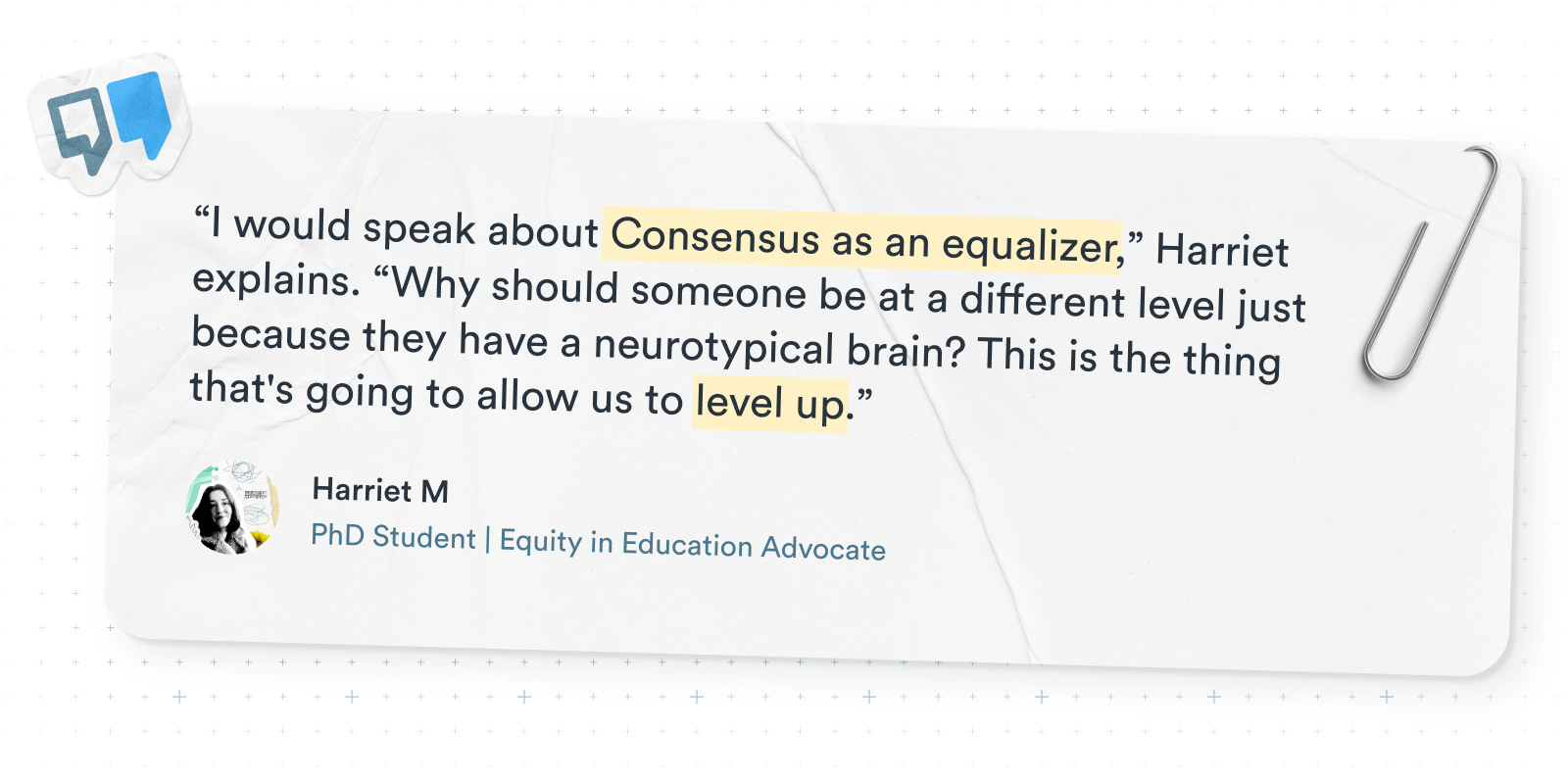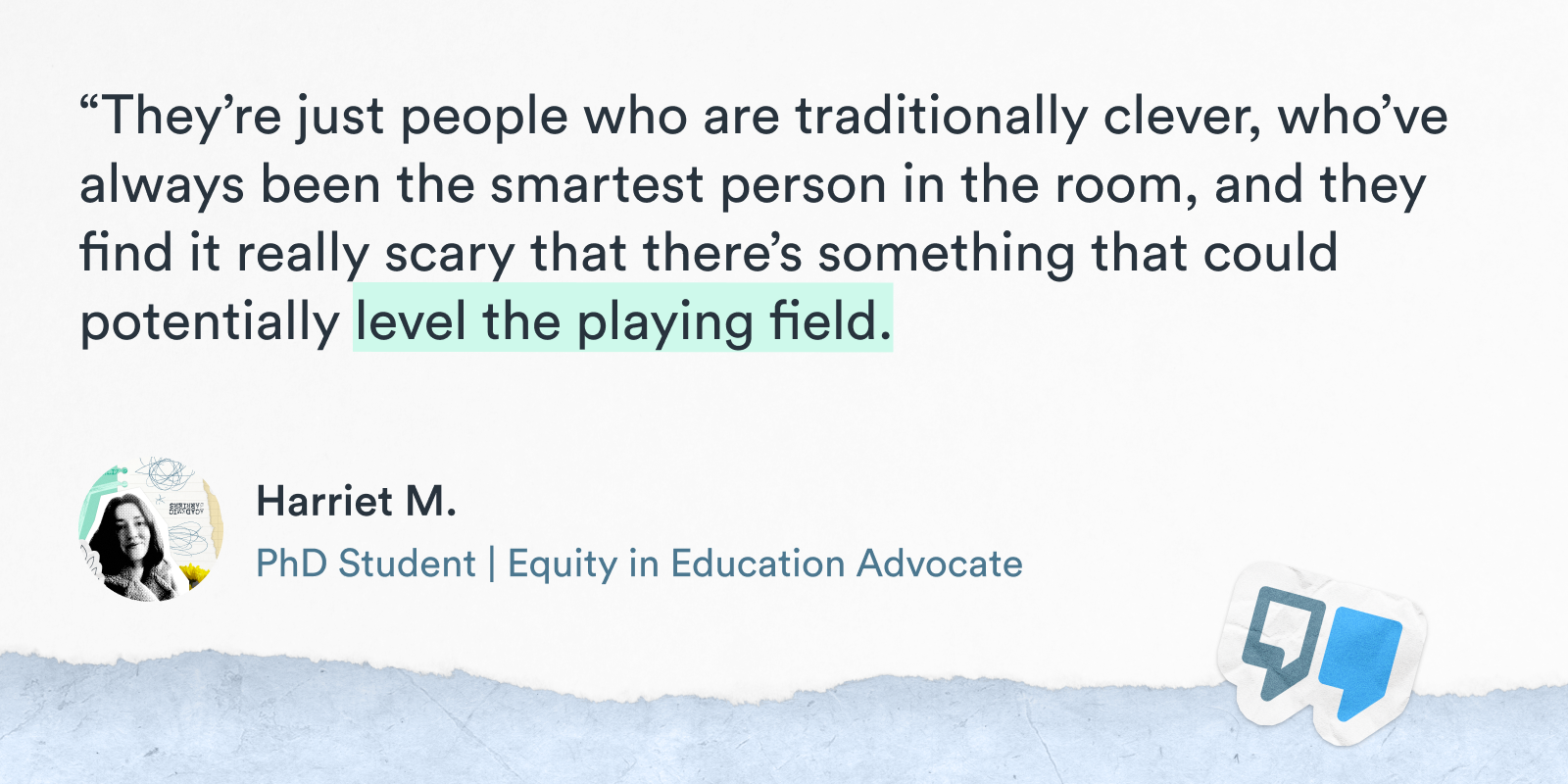Harriet believes in a world where academic success isn’t determined by how quickly you can read or how much information you can memorize, but by the quality of your ideas and the questions you ask.
As a PhD student at the University of the West of Scotland, focusing on young people’s mental health and school environments, Harriet is passionate about creating equitable systems that support well-being. Her academic journey has been shaped by her own experiences with dyslexia and ADHD, challenges that led her to discover tools like Consensus.
For Harriet, Consensus represents more than just a helpful tool — it’s a kind of equalizer. As she puts it, the platform allows neurodivergent students to engage with research on the same level as their peers by surfacing quality information quickly.

Inclusive by Design
Harriet’s search for effective research tools began long before the rise of AI. Since 2009, she has relied on assistive technologies to support her academic work, well before they became mainstream. For her, these tools were never shortcuts or cheats. They were a means of accessing education on her own terms.
“People with disabilities have always used additional support technologies to streamline their work,” she explains. While some peers questioned the legitimacy of these tools, Harriet understood their value immediately. They allowed her to participate fully in the academic world, despite the challenges posed by dyslexia and ADHD.
As someone who has long relied on assistive tools, Harriet immediately saw how Consensus made research more accessible by designing for ease of interpretation rather than assumed expertise. Visual cues like Q1 and Q2 journal rankings and stance summaries, which use color to show how much agreement exists across studies on a given question, helped her quickly grasp the strength and relevance of the evidence. “It’s easier to quickly see the value in information that Consensus has pulled for you,” she says. “That’s really helpful as a visual for someone like me who’s not academic from the word go.”

A Research Companion
For Harriet, Consensus isn’t just another search tool. It’s become a kind of research companion, especially in the isolating landscape of post-pandemic academia. With fewer in-person interactions and more remote work, she’s found herself craving intellectual dialogue. “We’re quite siloed. Since COVID, everyone works from home…so we don’t see a lot of people in the office,” she shares. In this context, Consensus provides more than citations; it offers momentum.
Harriet describes the experience of using Consensus as similar to “body doubling,” a concept familiar to many neurodivergent individuals, where simply having a presence, real or virtual, helps maintain focus. “Having Consensus suggest papers first… it’s almost like it’s saying, ‘Hey, I’m here.’” This kind of responsive interaction helps her get started when she’s staring down a blank page or returning from fieldwork.
When she’s deep into her research, such as exploring creative methodologies with marginalized youth, Consensus helps her stay grounded. “I can go back and use it like a conversation partner,” she says. “I’ll type in something like, ‘Tell me about photovoice with marginalized youth,’ and it returns a collection of relevant papers I can save and organize by methodology or setting.”
In this way, Consensus becomes a partner in Harriet’s thinking process. It doesn’t just surface literature. It helps her shape and refine the questions that matter most.
Breaking Down Academic Barriers
Perhaps most powerfully, Harriet sees Consensus as a tool that challenges long-standing gatekeeping in academia. She knows how quickly academic communities can label innovation as “cheating,” especially when it disrupts traditional measures of success. Harriet has experienced this stigma firsthand from academics who resist AI tools, often because they are used to systems that reward memorization, speed, and insider knowledge.
She believes that discomfort stems from something deeper. It’s a fear that these tools might shift the focus of academic achievement from rote performance to original thinking and equitable access.
That’s what makes Consensus so radical in her eyes.

Zeroing in On Impact
Harriet challenges the notion that exhaustive manual review of literature is a marker of academic rigor. In her view, filtering hundreds of papers to identify a few credible sources is not a demonstration of critical thinking. It’s a task that should be automated. Consensus allows her to offload that front-end burden by surfacing the most relevant, high-quality research first, enabling her to concentrate on more impactful work: interpreting findings, evaluating methodologies, and pursuing questions that matter.
“We don’t have to read a hundred papers to recognize the four good ones,” she explains. “Consensus gives us the top ten, shows us which journals they’re from, and then we decide what to do next.”
By streamlining the filtering process, Consensus does not diminish academic depth. It facilitates it. For Harriet, this efficiency is not just practical. It is political. It opens up academic research to those who have historically been excluded by systems that conflate endurance with intelligence.
Favorite Features That Make the Difference
When asked about the tools she relies on most, Harriet highlighted three key features that have become essential to her workflow:
Looking Beyond Academia
After completing her PhD, Harriet plans to keep using Consensus in her work with charitable organizations, where she sees major potential for AI tools to drive efficiency and equity.
“In the UK, in our system, they don’t have a lot of money. So your pay is very low. If they start to utilize these tools, that’d just be massive. They would be able to free up so much time and resources.”
She hopes to help build infrastructure that supports wider adoption of tools like Consensus in the nonprofit and education sectors.



